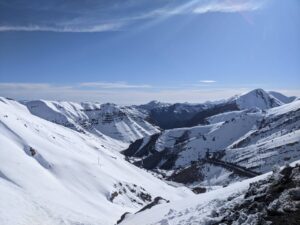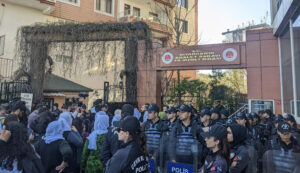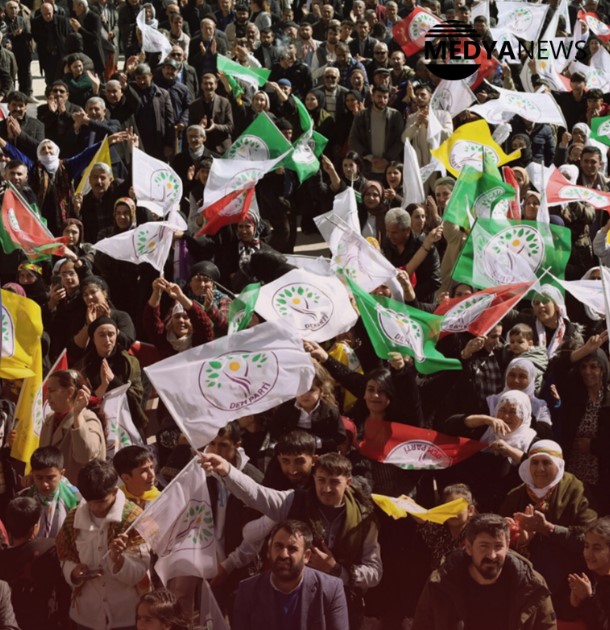Hazel saw a military helicopter that they were informed had brought soldiers to vote, and witnessed a long line of soldiers in civilian dress waiting to cast their ballots. But the observers were restricted in where they could go, and in inspecting voter lists.
She contrasted the victory celebrations in Diyarbakir (Amed) with the anger and worry in Şirnak – at the stolen election due to the votes of thousands of soldiers brought from outside, and at the prospect of the coming years of AKP control. And she described the immediate post-election repression and arrests in Şirnak.
Hazel attended protest statements in Amed, following the government’s refusal to recognise the elected mayor of Van, and observed the importance of the presence of the Saturday Mothers.
She finished by trying to convey the sense of powerful resistance that she could feel in the Kurdish region and that she was reluctant to leave behind.
Below is the full transcript of the interview:

Dem baş. This is Sarah Glynn for Media News, and I’m talking today with Hazel, who is one of two women who came from Scotland to observe the elections at the invitation of the DEM Party, and is just now in the airport on her way back to the UK.
So, Hazel, obviously a lot has happened since the actual election itself, but you were there to observe the election, so I think we should start with that. And I wondered, for the benefit of people who’ve not been to a Turkish election, if you could just describe – well, describe where you went, where you were – but also what the polling station is like, who’s allowed in, what sort of privacy you get for voting, what sort of security there is to protect the ballots themselves, and whether there’s pressure on the voters from people outside.
Yeah, so I’ve also been to the general election last year, which was a little bit different to this year’s municipal elections, and I think it’s also a little bit regional. So, all over Kurdistan region, also Turkey, it’s generally in schools that people go to vote, and there are certain laws pertaining to the schools. So, for example, police shouldn’t have weapons with them if they’re actually inside the polling booth, like the room that people are voting in. And last year, there was a proper booth inside the polling stations that did afford people a bit more privacy, but I didn’t personally see that at this one, but we were in quite a remote village in Şîrnak province, and it was called Beytüşşebap in Turkish, or Ilkê in Kurdish. And yeah, there wasn’t actually really any privacy, to be honest, in the rooms, but people will make their vote, and there’s a sort of desk that people from each party – so DEM Party, AK Party, CHP – they all also sit in the room as well, and they’re kind of responsible for overseeing the process. So, there’s a bit of a collective management of the day, and there’s quite a lot of people from each political party there as well, and also outside the schools, and I’m sure we’ll get into this more later. It does depend on the region, so what we saw in Ilkê or Beytüşşebap is, there’s the Jandarma outside the schools, which is like militarised police, and there’s also plainclothes police, and also uniformed, but there’s the militarised and armored vehicles outside.
So, did you get a sense that there was pressure on voters?
So, this is what we asked people, actually, who were there, and they did tell us that they did feel quite a bit of pressure, and I think that also, one thing to keep in mind is that, actually, there’s a normalisation of the militarisation of the region, because there’s checkpoints, there’s military checkpoints when you move inside or outside of the cities in Kurdistan region. You can see the Jandarma (Gendarmerie), or the military – there’s military bases all over the place, inside cities, etc. So, I think that there is a desensitisation, actually, as well; but of course, it does also create the psychological pressure, and for example, there was big families from the AK Party outside in the school grounds that we saw ourselves, and it was like an extended family. And people were also telling us this is also a type of psychological pressure, and they also felt intimidated. And it was also reported that – not where we were, but at another location – that some of the police did have weapons with them inside the schools, as well.
And anyway, they’re allowed weapons just outside the schools.
Yes, they’re allowed weapons outside of the schools, including the military vehicles themselves, which were literally parked right outside the gates, literally right opposite the entrance to the schools, multiple ones, actually. And also, one thing that we saw too is a military helicopter actually landing directly next to the school, which we were told was bringing soldiers in from Şirnak, like central, the actual city. And then, you know, we were in quite a remote area up the mountains, and we went to the first school, and then we went to two others, and then we were told, oh, go back to the first school, because now a lot of soldiers have just come. And you know, in the region, it’s occupied militarily, so there are soldiers around, but people know who are the local soldiers. You know, there’s not thousands and thousands of soldiers in each place, usually. And when we went back to the first school, there was this long line of soldiers in plain clothes who were waiting to vote, and it was a very, very tense atmosphere, and we basically were quite abruptly asked to leave.
They wouldn’t actually let us be present inside the polling station on that occasion. And yeah, we saw the helicopter, because it wasn’t there when we first arrived, and then when we went to the schools, and then it had arrived, and then it left when we were there.
And were people able to see the voters’ lists there? Were all these soldiers’ names on the voters’ lists?
So, one of our friends who was with us – one of our colleagues who was with us, who was also doing the observations, she has a press card, she’s a journalist, she was allowed to look, but we were not allowed, and we were barred from looking at the lists. But there is many, many areas that people have had more access to the lists, and Şirnak is one of them, Şirnak Central, that has shown hundreds and hundreds of male names who – and no women at some addresses at all – but just hundreds and hundreds of male names, which aren’t normal military bases. And what we were told is that this is basically soldiers coming from outside, who have been sent here by the state, and they are using other people’s addresses to be able – because you know it’s municipal, so you have to have like a specific local registered address to be able to vote in that district. And yeah, there’s been like a lot of this military people coming and voting.
Over 6,000 in Şirnak, I think.
I know at the general election there was a lot of concern about guarding the ballot boxes, and then there were also problems about changes made when the votes were transferred onto the final system. Were either of those issues this time around, or not?
Yeah, so this was definitely a thing last time. There was really clear evidence, for example, of votes getting transferred from DEM Party to MHP last time – well it was Yeşil Sol (Green Left) Party last year, but to MHP – and then they even ended up being transferred back in the appeals process at points, but I haven’t heard of that myself this time. But also, it’s one of those things that, you know, I think it’s really hard sometimes to catch the ways that manipulation happens. And there’s been really widespread observation amongst the independent observers about this practice with the soldiers, and this is something that – it’s in specific areas, it doesn’t happen in every single area, obviously – but it’s, yeah, it’s very difficult to appeal this process. And it didn’t really seem like the ballot box issue was something that was really focused on this year, but they were already aware of the extra people signing up in the municipalities this time, so that has been the main focus this year.
I heard calls for guarding the ballot boxes, but I didn’t hear of any actual concerns, I think.
I haven’t heard of any myself.
And what immediately afterwards, as the results started coming in – I mean, before things started happening in Van – what was the general view of the elections from the DEM Party, because I think you were with people in the party after the elections as well.
Yeah, so I mean, I was in two different places – in Şirnak at first, and then I went back to Amed. And it was really different in both places, because, you know, in Şirnak, people were really hurting, because AK Party, for the central area, was elected again. And people were pretty furious, and also worried. People are really worried about their future, and they’re very angry, because they feel it’s a very, very undemocratic process. And straight afterwards, on the same day as the elections, there was an attack on the party office by the police, and they arrested at least a dozen people, I think two dozen people – so two of the responsibles in DEM Party, and then also quite a few youth as well. And when we were leaving the next day, we heard that the DEM Party members had been released, but a lot of the local young people were still being detained. And this is just like a kind of – I think that that’s very symbolic, actually, because straight away, there’s repression. And I mean – you just mentioned Van already, but even when there is a secure vote for the DEM Party, it doesn’t mean that repression doesn’t come. But when people don’t have control of their own municipality, and that really affects, you know, funding, that affects education, that affects all of these different things. It affects also, you know, state propaganda. It affects state control, it affects state access to the border – for example, going south and east, and Şirnak is a really strategic location for the state’s war policies. All of these things are affected in people’s everyday lives. And somebody – not a DEM Party member, but just like a local person – was saying to me – he was saying, I’m really worried about my child’s future. She’s only three years old, but again, and again, and again, this keeps happening. I don’t know what I can do. And then for DEM Party, people were really exhausted, but they were just busy the entire time. They were saying, we’re going to appeal this, we’re not going to stand for this, you know, they have cheated the system. And there was this feeling of loss.
But there wasn’t much, I’ve seen in Western media. There’s been a lot of dialogue around – oh, CHP, they’ve done so well; oh, this is such a win for democracy, because AKP have done really badly in this election. But people don’t talk about the Kurdistan region, and don’t see that AK Party can’t even – they can’t even keep hold of their own seats in the West. But still, they try and coup them, basically, from the Kurdish regions, for their war policies, and for political reasons.
But when I went back to Amed – so I didn’t see it myself, because we’re in Şirnak, but I did see a lot of videos that showed there was a big celebration. People were really happy, but there was this focus on the other regions, it wasn’t cut off. I think the first day, people were dancing in the streets, big, big celebrations, but by the time we got back, people were just really focused on Şirnak, and then also the other regions where AKP had sent soldiers, or just where they’d also just done well, you know. And then, also what happened in Van after. So, yesterday, all day, there was just announcements, protests. The people in DEM Party were incredibly busy, I have to say, from morning until evening, just full-on organising: visiting the family of the martyr, the shaheed [the DEM Party election official who was killed in a polling station dispute]; organising announcements, where police also repressed people, and two people were arrested from that – nothing like what we’ve seen in the further east regions, where people have been really being attacked viciously by the police, and, you know, there’s a bigger answer, I think, there – but still, people were then focused on that…
It’s not clear what’s going to happen now. I was asking people. I was saying, do you think that… will come again, is this going to be the policy of the state this time, because it happened so much last municipal election. And people’s answer was just, we just don’t know. We just don’t know what’s going to happen. It’s just very unclear.
Which is frightening in itself, of course, the not knowing. So, I don’t know when you had to leave that area. Were you able to see any of the protests about what was happening in Van?
In Amed. Yeah.
Reactions to the removal of the mayor, of the elected mayor in Van – were you able to see any of the reactions to that?
Yeah, in Amed, I went to a couple of the announcements and protests, and the thing is, like, even just an announcement, which is what it actually was – or announcement is maybe not quite the right translation, but a kind of, like a statement against what happened – like, even these things, when they’re made publicly, are very, very, criminalised by the police. So, maybe in Western Europe you could make a statement saying, oh, the state did this, and it wasn’t good, blah, blah. But, in Bakur [North Kurdistan/southeast Turkey] you’re surrounded by armed police, armoured vehicles. Lots of people already have criminal cases or have spent a significant time in prison, and these are the kind of things that can certainly get people arrested again and sent to prison. So, there’s quite high stakes, even with just standing up and denouncing …
And there was one protest outside one of the legal centres, and that was made by DEM Party members, and two of the MPs, so one person was Abbas Şahin, and then also Pınar as well. They’re both MPs in Amed region. And then also, directly after that, there was another announcement in a park in Amed, and that was by the Democracy Platform, which is particularly, like a labour platform.
And there were people from other parties or from…

Yeah, I mean, in general, the people who attended, it wasn’t only DEM Party members who were there. It’s just people in the community, basically, people who agree with the fact that what happened in Van was extremely undemocratic and unfair, and it didn’t reflect the will of the people. And the second event, I’m not sure, I would need to find out exactly which groups it was present, actually, and yeah, but there was, like, a kind of mix of people from, like, various groups, and also non-affiliated people as well. Not everyone was specifically a member of a specific organisation who was present. There was, oh, and the Saturday Mothers as well, the mothers of the martyrs, and also of the missing people who had disappeared in the 90s. So, when everyone was going to this court in the first announcement, the first denunciation, some people tried to enter. And they weren’t allowed, of course, they weren’t allowed to go in, but there was this big crowd of people, maybe a couple hundred people, and the mothers who, you know, they were walking as a group, and they have the white veils on their head, they’re very, very distinctive. And they’re really, really, really strong embodiments of the principles of the struggle there, and what people sacrificed, and what people continue to do as well, despite such a deep and painful struggle. They tried to get in, and when they first came, everyone started clapping and applauding, and people were chanting. It was really, really beautiful to see how people reacted to their presence as part of that struggle, and part of the wider statement. And they were also at the second denunciation as well, which was in the park. They didn’t speak at it, but there was – yeah, like I said, it was kind of a mix of people present, and – just one second, I’m just gonna check something… I had a thing where I wrote down the chants that people were making, but I’m just struggling to find it…
You were looking for the chants that were said at these demonstrations, so do give us some examples.
Yeah, so, well, one chant that people were chanting is, long live the resistance of Van, so, “Biji Berxwedana Wanê”, and also, “Resistance is Life”, and also, “Kurdistan will become a grave for fascism”, and, yeah, I thought it was just a very – like, every time somebody would make a speech, the young people in the crowd would start leading the chants. Yeah, that was all.
So, is there anything else you want to add before I let you go and catch your plane?
It’s really hard to – I thought there is something that I want to add, but it’s really hard to put into words. And I feel really, like I really wish that I wasn’t leaving now, because the different layers of society that say, and one of the other chants, the translation in English is, “we will win by resisting”. I think that that is just such a present spirit and energy, and that is something that is really beautiful and inspiring; and yeah, I’m sure that people really will resist. And if it really is the case that the mayor has, again, been reappointed, I think that that really just shows like that chant, that we will win by resisting, is completely true. And whatever happens now, because I think that the democratic process is completely – it’s not respected in Kurdistan region especially. And I think that we need to stop invisiblising the politics there, when we talk about Turkey as a whole, and the democratic process in Turkey as a whole, and, you know, not see CHP as this kind of – oh great, everything’s answered now, blah, blah, blah. I think that, yeah, the struggle is really alive, and we also need to find ways to support it, that’s all.
Thank you, and bring that spirit of struggle back to Scotland with you. Thanks very much.
Thank you for having me.
Sarah Glynn is an activist from Scottish Solidarity with Kurdistan who writes for Medya News.
For a full report of the local election results and the successful resistance movement to the annulment and subsequent reinstatement of the successful DEM candidate in the municipality of Van, see Sarah Glynn’s article ‘Resistance Works!‘ https://medyanews.net/resistance-works-a-weekly-news-review/
Interview originally published by Medya News: https://medyanews.net/from-a-polling-station-in-the-sirnak-mountains-an-interview-with-hazel-an-election-observer-from-scotland/
Note by Ecosocialist.scot: [1] DEM Party – Peoples’ Equality and Democracy Party is a pro-Kurdish political party in the Turkish state. It is the legal successor of the Green Left Party (Yesil Sol) and with the Peoples’ Democratic Party (HDP) handing over its work to this party in 2023, it has become the latest iteration of Kurdish interests in Turkey. It won 10 provinces and 2.6 million votes (5.7%), the fourth highest vote in the elections of 31 March.
Photo: DEM Party Election Rally, Medya News



